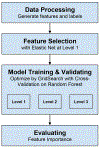Temporal multi-step predictive modeling of remission in major depressive disorder using early stage treatment data; STAR*D based machine learning approach
- PMID: 36584711
- PMCID: PMC9863277
- DOI: 10.1016/j.jad.2022.12.076
Temporal multi-step predictive modeling of remission in major depressive disorder using early stage treatment data; STAR*D based machine learning approach
Abstract
Background: Artificial intelligence is currently being used to facilitate early disease detection, better understand disease progression, optimize medication/treatment dosages, and uncover promising novel treatments and potential outcomes.
Methods: Utilizing the Sequenced Treatment Alternatives to Relieve Depression (STAR*D) dataset, we built a machine learning model to predict depression remission rates using same clinical data as features for each of the first three antidepressant treatment steps in STAR*D. We only used early treatment data (baseline and first follow up) in each STAR*D step to temporally analyze predictive features of remission at the end of the step.
Results: Our model showed significant prediction performance across the three treatment steps, At step 1, Model accuracy was 66 %; sensitivity-65 %, specificity-67 %, positive predictive value (PPV)-65.5 %, and negative predictive value (NPV)-66.6 %. At step 2, model accuracy was 71.3 %, sensitivity-74.3 %, specificity-69 %, PPV-64.5 %, and NPV-77.9 %. At step 3, accuracy reached 84.6 %; sensitivity-69 %, specificity-88.8 %, PPV-67 %, and NPV-91.1 %. Across all three steps, the early Quick Inventory of Depressive Symptomatology-Self-Report (QIDS-SR) scores were key elements in predicting the final treatment outcome. The model also identified key sociodemographic factors that predicted treatment remission at different steps.
Limitations: The retrospective design, lack of replication in an independent dataset, and the use of "a complete case analysis" model in our analysis.
Conclusions: This proof-of-concept study showed that using early treatment data, multi-step temporal prediction of depressive symptom remission results in clinically useful accuracy rates. Whether these predictive models are generalizable deserves further study.
Trial registration: ClinicalTrials.gov NCT00021528.
Keywords: Decision trees; Depression; Machine learning; Predictive models; Remission.
Copyright © 2022 Elsevier B.V. All rights reserved.
Conflict of interest statement
Conflict of interest TH is currently employed by Bayer Pharmaceuticals. JCS has been an advisor or received research grants from Compass Pathways, Livanova, Boehringer Ingelheim, Relmada, J&J, and Alkermes. AJR has received consulting fees from Compass Inc., Curbstone Consultant LLC, Emmes Corp., Evecxia Therapeutics, Inc., Holmusk Technologies, Inc., Johnson and Johnson (Janssen), Liva-Nova, MindStreet, Inc., Neurocrine Biosciences Inc., Otsuka-US; speaking fees from Liva-Nova, Johnson and Johnson (Janssen); and royalties from Wolters Kluwer Health, Guilford Press and the University of Texas Southwestern Medical Center, Dallas, TX (for the Inventory of Depressive Symptoms and its derivatives). He is also named co-inventor on two patents: U.S. Patent No. 7,795,033: Methods to Predict the Outcome of Treatment with Antidepressant Medication, Inventors: McMahon FJ, Laje G, Manji H, Rush AJ, Paddock S, Wilson AS; and U.S. Patent No. 7,906,283: Methods to Identify Patients at Risk of Developing Adverse Events During Treatment with Antidepressant Medication, Inventors: McMahon FJ, Laje G, Manji H, Rush AJ, Paddock S. MHT has received research support from NIMH, NIDA, J&J, Janssen Research and Development LLC; has served as a consultant for Alkermes Inc., Allergan, Arcadia Pharmaceuticals Inc., AstraZeneca, Lundbeck, Medscape, MSI Methylation Sciences Inc., Merck, Otsuka America Pharmaceuticals Inc., and Takeda Pharmaceuticals Inc. SS has received honoraria from British Medical Journal Publishing Group and consultant or advisor for Worldwide clinical trials/Inversago and Vicore pharma. SS has received research support from Flow Neuroscience and is a study or sub-investigator for Compass Pathways, Relmada, LivaNova, and Janssen. HS, NT, and BM declare no competing conflict of interests associated with this work. No funding source had any role in the study design, data collection, analysis, interpretation, writing, or submission.
Figures




References
-
- American Psychiatric Association. Diagnostic and Statistical Manual of Mental Disorders (DSM-5®). (American Psychiatric Pub, 2013).
Publication types
MeSH terms
Substances
Associated data
Grants and funding
LinkOut - more resources
Full Text Sources
Medical
Research Materials

